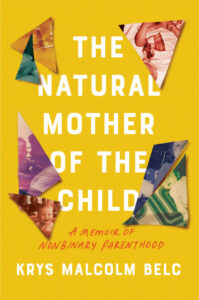
The Daily Tenderness of Cooking Dinner For Family
Krys Malcolm Belc on Gender, Parenthood, and Loving
Through Providing
The earliest dinner I remember: pasta. My dorm kitchen, boxers and a tee shirt. I kept quiet. I chopped vegetables. Did the work. Anna was my first serious girlfriend, my first girlfriend at all. The way food and gender and family all swirled together for me, she didn’t know any of that yet. She only knew I said I could cook pasta and there I was. We had meal plans and didn’t need this, this was for pleasure. While cooking, I am unselfconscious in this body, I know how and when to move. It was spring. I remember the lushness of the meal, everything green. We ate on sagging paper plates, standing in the grimy dorm kitchen. She stared at me. I loved my legs for the first time that year because she loved them, athlete’s legs, banged up to hell but still beautiful, in a way I only felt through someone else’s gaze. Standing at the counter I morphed into the me who would provide her meals, that night and so many more. I was young, a teenager still, with no clarity about my body and what form it was meant to take.
What is the work of my life if not making dinner? In family life love comes into vision through the actions one does again and again. That labor. I want my children to remember me reading with them on the couch, playing board games on the floor, hiking with them in the bracing cold. Above all, I want them to remember me as a writer, a creative. But they won’t. It is something they constantly forget I even do. When Anna takes them out of the house on a rare weekend she has off, if they ask why I am not coming, she will tell them I am working. On what? they will ask. They know I have a day job, but they forget this other life I have, want to have, that I have too little time for. In a few hours, they will come clamoring in the door again and they will expect a fresh meal. The work of my life, especially now, is them.
I know that the portrait my family has is of me standing in front of an open refrigerator, hand on generous hip, at the counter smashing garlic. Wearing a floral apron, frying chicken cutlets with soft music in the background. Every evening I am cooking. My meals are the things that are the same about each and every day, through everything. Wherever we live, whatever happens outside the house, I am expected to perform these daily actions of care. Growing up, I was not often told I was loved, not often touched. But in the kitchen I knew. My mother, too, largely exists as a memory in a kitchen: my throat catches thinking of the way she would shake salad dressing in that one glass bottle, lay her wedding band on the windowsill to roll meatballs.
Starting my first job as a high school teacher was the beginning of the collapse of my organized writing life. On the weekends, instead of writing I would make elaborate dinners: coq au vin, butternut squash ravioli. If I set aside five hours to cook, I knew I had the skill to make it work. If I sat down to write, I might fail. So much of my life then felt like a failure of imagination. It was only inside my relationship, inside my home, that I was entirely open about my nonbinary identity. Though cooking was stress relief, and though I loved food, I couldn’t help thinking that presenting Anna with these meals was a way of thanking her for staying with someone so turmoiled—a pent-up creative who could make up for it with killer brownies.
In family life love comes into vision through the actions one does again and again. That labor.
The first dinner I made for our first son was ceremonious: a sweet potato I turned into oven fries, careful not to salt the ones I might give him. Perfect food. I presented him with his prize and he spat it right out, then tossed the rest on the floor. He was six months old. Our grimy apartment kitchen was not the ideal place to make dinner. The maintenance person kept replacing one broken fridge with another that was on its last legs. Only one burner worked properly, and the oven door required a massive effort to open. We were disastrously tired. Could there be any real love in labor performed under these conditions? I’d waited for a night when Anna and I would both be home at dinner time, something that, that first year we had Sean, occurred on one weekend evening and one weeknight per month.
In order to avoid paying for childcare, we’d devised a schedule in which we literally handed the baby back and forth as we passed each other on our way to and from work. And now we sat watching our son reject my perfect dinner. I had read so much about feeding your kids, endless Facebook mom groups threads, so much internet there was to read, and I had not yet heard about the kids who toss literally everything you try to prepare for them.
Having a child, and then another, and then a third all but decimated the quiet, concentrated time I once believed I needed to create. Always, every moment, someone needed to be fed: fed a bottle, fed my breastmilk, fed the ubiquitous “puff” snacks millennials use to keep their children occupied if only for a moment, and then, of course, there were actual meals. My eyes misted over the first time one of my children got his own glass of water. Before I had children, I would skip a meal if I had something better to do. I had things to write, to make. My mother, too, made things: curtains, tablecloths, wreaths. But when I write about her she is always, always in the kitchen. Did she stand over her pots of red sauce wishing to be making a different self for the six of us to remember? Children lock you into the world of their time, their endless bodily needs that have nothing to do with our adult wants.
When I met Anna, when I made her that first pasta, I was a fiction writer. Many mornings I wrote fiction from the moment I woke up until I became too hungry to postpone lunch any further. I sat in the same library chair each time. My stories were long and serious, stiff even. Fiction can be a wonderful vehicle for intimacy, but mine was decidedly not. Slowly, over the years, as my children grew up, grew into robust, voracious eaters and people, I became a memoirist.
I started in the nonfiction style that seemed to fit my life best: I kept what can only now be described as a mom blog. My handful of Blogspot readers learned about my children’s developments, the little adventures we would take to playgrounds and ice cream parlors. And I read them, too. Women who wrote about their daily lives, about my daily life, they made me feel like creativity was possible. For much of my parenting life, I have been the primary caregiver, and I have always been the one for cleaning and especially for cooking. I took photographs of my children eating, rubbing yogurt in their hair. My mother made curtains because there were windows right in front of her, windows that needed dressing. I looked around my home, around my kitchen, and I wrote into that space.
When I began to study writing in my late 20s, when my youngest was an infant, I learned about the essay. I tried it, and food kept sneaking into my writing. Every time an essay had a section with too little grounding, I wrote myself into the kitchen. In my writing I made pies, cakes, chicken fried steak. For my mother, cooking was not art: it was just what she had to do. In the year that has become a year inside I wake up and go to sleep thinking of making dinner. Each day my children will be hungry and they will need me. Sometimes my thoughts of feeding my family are beautiful but mostly they are oppressive, but isn’t that everything else? My gender, my parenting, my work and art? The contents of my refrigerator, of my cupboards, follow me throughout the house, haunting and pushing me. I take meetings for my day job in a child’s bedroom slash workout space slash office and all the while I make mental notes of what is left in the house, of what I can make for our dinner. What can I give today? What can I make of what I already have?
__________________________________

Krys Malcolm Belc’s The Natural Mother of the Child is available now from Counterpoint Press
Krys Malcolm Belc
Krys Malcolm Belc is the author of The Natural Mother of the Child, and his work has appeared in Granta, Black Warrior Review, Tin House Online, The Rumpus, and elsewhere. He lives in Kensington, Philadelphia with his partner and their three young children.



















